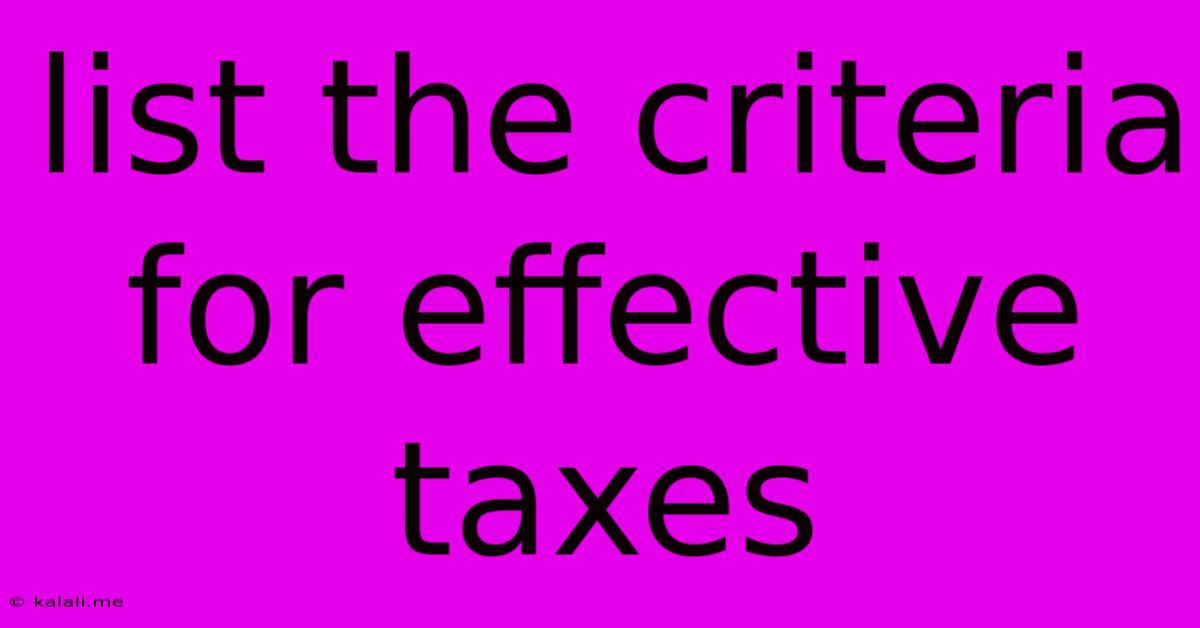List The Criteria For Effective Taxes
Kalali
Jun 16, 2025 · 3 min read

Table of Contents
The Criteria for Effective Taxes: A Comprehensive Guide
Meta Description: Learn the key criteria for effective taxes, including fairness, efficiency, simplicity, and transparency. This guide explores the principles of good tax systems and their impact on economic growth and social well-being.
A well-designed tax system is crucial for a functioning society. It funds essential public services like healthcare, education, and infrastructure, while also influencing economic activity and social equity. However, designing an effective tax system is a complex undertaking, requiring careful consideration of multiple criteria. This article will explore these crucial criteria, examining what makes a tax system truly effective.
1. Fairness (Equity): The Cornerstone of a Just System
Fairness, or equity, is arguably the most important criterion. A fair tax system should distribute the tax burden justly among citizens, considering their ability to pay. This often involves progressive taxation, where higher earners pay a larger percentage of their income in taxes. However, the definition of "fairness" itself can be debated, with different perspectives existing on how to best measure and achieve it. Key considerations within fairness include:
- Horizontal Equity: Individuals with similar incomes and circumstances should pay similar amounts of tax.
- Vertical Equity: Individuals with higher incomes should pay a proportionally higher amount of tax.
Discussions about tax fairness often involve examining different tax models, such as a flat tax versus a progressive tax system, each with their own advantages and disadvantages in terms of equity and efficiency.
2. Efficiency: Minimizing Economic Distortions
An effective tax system minimizes distortions to the economy. High taxes can discourage work, saving, and investment, hindering economic growth. Ideally, a tax system should be designed to raise the necessary revenue with minimal negative impact on economic activity. Efficiency considerations include:
- Administrative Costs: The system should be relatively inexpensive to administer, both for the government and for taxpayers.
- Compliance Costs: Taxpayers should not face excessive burdens in understanding and complying with tax laws.
- Deadweight Loss: Taxes should minimize the loss of economic efficiency that occurs when individuals alter their behavior to avoid taxes.
3. Simplicity and Certainty: Ease of Understanding and Compliance
Complexity in tax laws can lead to confusion, errors, and increased compliance costs. An effective tax system should be clear, straightforward, and easy to understand. This reduces the administrative burden on both taxpayers and the government. Simplicity also fosters certainty, allowing individuals and businesses to plan their financial affairs with confidence. Key aspects include:
- Clear and Concise Tax Laws: Easily understandable language and straightforward rules.
- Predictable Tax Rates: Stable tax rates that don't change frequently.
- Accessible Information: Easy access to information and resources about tax laws and regulations.
4. Transparency and Accountability: Public Scrutiny and Oversight
Transparency ensures that the tax system operates openly and honestly. Citizens should have access to information about how taxes are collected, allocated, and spent. Accountability mechanisms are also crucial to prevent corruption and misuse of tax revenues. This includes:
- Public Audits of Tax Revenue: Independent verification of tax collections.
- Clear Reporting of Tax Expenditures: Public disclosure of tax breaks and subsidies.
- Mechanisms for Public Input: Opportunities for citizens to participate in shaping tax policy.
Conclusion: Striking a Balance
Designing an effective tax system involves balancing these competing criteria. There's no single "perfect" system, as the optimal balance will vary depending on a country's specific economic and social context. However, by prioritizing fairness, efficiency, simplicity, and transparency, governments can create a tax system that both funds essential public services and promotes a healthy and prosperous economy. Ongoing evaluation and adjustments are essential to maintain a tax system that effectively serves the needs of its citizens.
Latest Posts
Latest Posts
-
How To Create Clickable Image In Html
Jun 16, 2025
-
What Are The Factors Of 121
Jun 16, 2025
-
What Is A Theme Of The Passage
Jun 16, 2025
-
A Company That Provides Access To The Internet
Jun 16, 2025
-
Which Word Is Closest In Meaning To The Underlined Word
Jun 16, 2025
Related Post
Thank you for visiting our website which covers about List The Criteria For Effective Taxes . We hope the information provided has been useful to you. Feel free to contact us if you have any questions or need further assistance. See you next time and don't miss to bookmark.